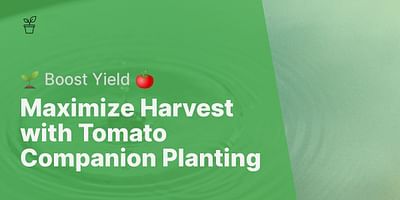Maxwell is a botanist and researcher who specializes in plant interactions. He has published numerous papers on the subject and is always looking for new ways to improve plant growth. In his free time, he enjoys playing chess and reading science fiction.
Dear reader,
When it comes to creating a successful vegetable garden, there are a few key gardening habits that can make all the difference. As a botanist and researcher specializing in plant interactions, I've seen firsthand how these habits can maximize your garden's potential. So, let's dive into the best gardening habits for a thriving vegetable garden!
1. Companion planting: One of the most effective habits you can adopt is companion planting. This is the practice of growing certain plants together to benefit each other. For example, planting marigolds alongside your vegetables can help repel pests, while planting basil near tomatoes can enhance their flavor. By choosing the right companions, you can promote healthy growth and deter pests naturally.
2. Rotate your crops: Crop rotation is another essential habit for a successful vegetable garden. This involves changing the location of your crops each year to prevent the buildup of pests and diseases. By rotating your crops, you disrupt the life cycles of pests and reduce the risk of soil-borne diseases. A simple three-year rotation plan is to group plants from the same family together and then move them to a different spot the following year.
3. Practice proper spacing: Giving your plants enough space to grow is crucial for their overall health. Crowded plants can compete for resources and become more susceptible to diseases. Be sure to follow the recommended spacing guidelines for each vegetable variety. This will allow for proper air circulation, sunlight exposure, and root development, resulting in healthier and more productive plants.
4. Provide adequate water: Watering your vegetable garden correctly is essential. Most vegetables require about 1-2 inches of water per week, either from rainfall or irrigation. It's best to water deeply and less frequently rather than shallowly and frequently. This encourages deep root growth and helps plants withstand dry periods. Additionally, consider using mulch around your plants to conserve moisture and suppress weeds.
5. Fertilize wisely: Feeding your plants with the right nutrients is crucial for their growth and productivity. Before planting, enrich your soil with organic matter like compost or well-rotted manure. During the growing season, you can use organic fertilizers or foliar sprays to provide additional nutrients. However, be mindful of over-fertilizing, as this can lead to excessive foliage growth and reduced fruit production.
6. Regularly weed: Weeds compete with your vegetables for nutrients, water, and sunlight. To keep them in check, make weeding a regular habit. Remove weeds when they are small to prevent them from establishing a strong root system. Mulching can also help suppress weed growth and conserve soil moisture.
7. Monitor for pests and diseases: Regularly inspect your plants for signs of pests or diseases. Early detection is key to preventing widespread damage. Consider using organic pest control methods, such as handpicking pests, using insecticidal soaps, or attracting beneficial insects. If you notice any signs of disease, promptly remove and dispose of infected plants to prevent the spread.
By incorporating these gardening habits into your routine, you'll be well on your way to a successful vegetable garden. Remember, gardening is a journey of learning and experimentation, so don't be afraid to try new techniques and adapt as needed. Happy gardening!
Sincerely,
Maxwell Bloom















